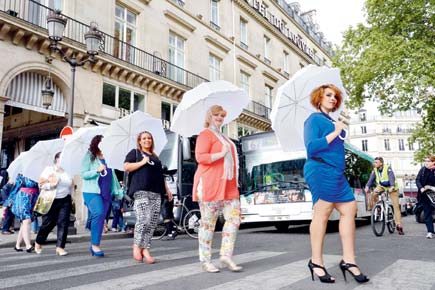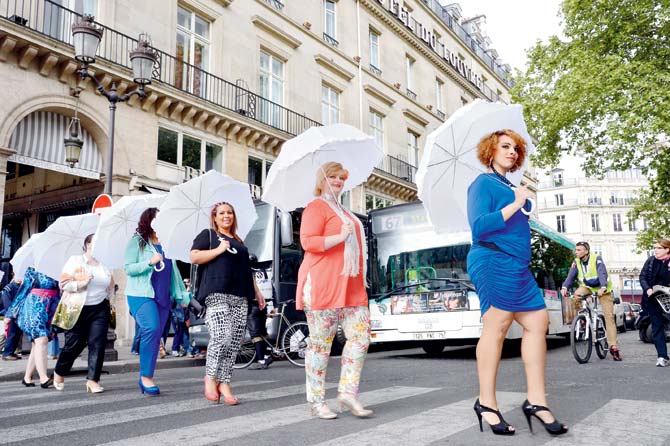Feminism and fashion need not be foes, but in present times, protesting the tyranny of fashion need not be confined to feminists

 Ahead of the Lakme Fashion Week, a discussion was held at the Godrej India Culture Lab on Feminism and Fashion — Navigating a Knotty Terrain.
Ahead of the Lakme Fashion Week, a discussion was held at the Godrej India Culture Lab on Feminism and Fashion — Navigating a Knotty Terrain.
ADVERTISEMENT
In urban Indian, we live at a time when women’s rights are taken for granted — until an incident of workplace harassment, domestic violence or rape makes it to the media. So is that even something to be discussed?

In the West, several renowned magazines and fashion houses have started promoting a healthy look instead of a skinny one. Pic/AFP
Maybe more so today, when despite all the gains that feminism has got women, a lot of them deride the movement and many more believe that to get ahead in a man’s world, they have to use their looks more than talents. All things being equal, an employer will still hire an attractive and well-dressed woman, and a man will want to marry beauty over brains.
When obsession with fashion gets out of hand is when women are forced to conform to unrealistic standards of beauty — and this has happened down the ages. In China, women’s feet were bound for centuries because small feet were the yardstick of attractiveness; in another African tribe, elongated necks are considered beautiful, so women are forced to wear metal rings around their necks.
Now women have to be so skinny that their thigh gap shows, or have waists so thin they can take their arm around their back and touch their belly buttons. All these absurd trends influence millions of young women into starving and older women into resorting to desperate measures to look slim and youthful, because society demands it of them.
One of the panelists, Mallika Dua, who wants to be an actress, spoke candidly about body-shaming — at auditions she is constantly told that she must lose weight. We have seen how actresses such as Sonakshi Sinha and Parineeti Chopra have been trolled for being overweight; the fat girl is always the leading lady’s stupid friend everyone usually makes fun of.
Even in the West, there are periodic discussions on this issue, and some fashion magazines as well as fashion shows have started promoting a healthy look instead of a skinny one. But the fashion industry thrives by making women feel insecure about their looks, so such token gestures are usually lost.
This emphasis on beauty and trendiness is something the feminist movement has not been able to tackle. Conversely, feminists are so often reviled as ugly, hairy-legged harridans, that they too have to conform to fashion to some extent just to break that myth and be taken seriously.
Designer Anita Dongre spoke of how her fashion label does plus-sized clothing, and asserted that feminism is about women being themselves, and choosing to wear what they please. She mentioned the current ‘athleisure’ trend that women (and men) are going for in a big way, because it puts comfort first. So women can multi-task at work, home, gym and party in the same ‘look’.
Crafts revivalist, Laila Tyebji, who interacts with rural women, says that even the poorest want to dress in beautiful clothes; and that feminism does not mean you cannot look good. Her concern was for the exploitation of the craftspersons, who do not get the price they deserve for their work. People will pay thousands for a foreign brand but haggle for a few hundred rupees with a local artisan because there is no brand name attached to the clothes they make.
Still, how many women would have the confidence or courage to dress as they please? Even the most ardent feminist is unable to deal with an issue like, say, the burkini ban in France. If the point of feminism is freedom of choice, a woman should have as much right to cover her body as she has to bare it.
There is also the matter of fashion garments being made by a predominantly female workforce, in appalling conditions in Asian sweatshops. In this case, fashion is not just a feminist but a humanist issue.
If celebrities are mocked for repeating clothes and shoes, ordinary women are forced to discard perfectly good clothes because they are last-season. This culture of vanity and wastefulness is also something feminists condemn, while admitting that it is acceptable to love clothes and have an aesthetic sensibility without being a slave to fashion, and also being aware of how their clothes are being produced, marketed and sold.
Feminism and fashion need not be foes, but protesting the tyranny of fashion need not be confined to feminists. When the Cannes Film Festival made the idiotic rule that women had to wear high heels on the red carpet, Julia Roberts turned up barefoot, and who dare turn her away? Sometimes it is essentially fashionable — and feminist — to say boo to fashion.
Deepa Gahlot is an award-winning film and theatre critic and an arts administrator. She tweets at @deepagahlot
 Subscribe today by clicking the link and stay updated with the latest news!" Click here!
Subscribe today by clicking the link and stay updated with the latest news!" Click here!






